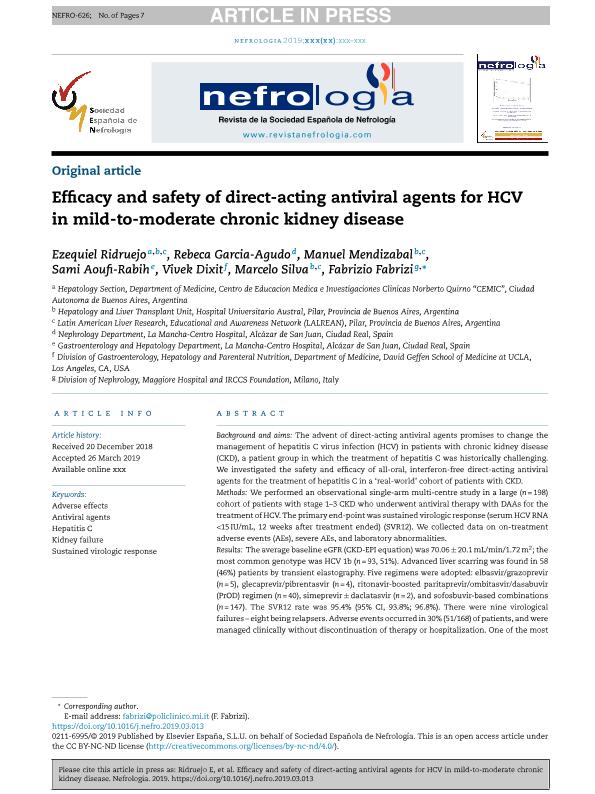Artículo
BACKGROUND AND AIMS:The advent of direct-acting antiviral agents promises to change the management of hepatitis C virus infection (HCV) in patients with chronic kidney disease (CKD), a patient group in which the treatment of hepatitis C was historically challenging. We investigated the safety and efficacy of all-oral, interferon-free direct-acting antiviral agents for the treatment of hepatitis C in a 'real-world' cohort of patients with CKD.METHODS:We performed an observational single-arm multi-centre study in a large (n=198) cohort of patients with stage 1-3 CKD who underwent antiviral therapy with DAAs for the treatment of HCV. The primary end-point was sustained virologic response (serum HCV RNA <15IU/mL, 12 weeks after treatment ended) (SVR12). We collected data on on-treatment adverse events (AEs), severe AEs, and laboratory abnormalities.RESULTS:The average baseline eGFR (CKD-EPI equation) was 70.06±20.1mL/min/1.72m2; the most common genotype was HCV 1b (n=93, 51%). Advanced liver scarring was found in 58 (46%) patients by transient elastography. Five regimens were adopted: elbasvir/grazoprevir (n=5), glecaprevir/pibrentasvir (n=4), ritonavir-boosted paritaprevir/ombitasvir/dasabuvir (PrOD) regimen (n=40), simeprevir±daclatasvir (n=2), and sofosbuvir-based combinations (n=147). The SVR12 rate was 95.4% (95% CI, 93.8%; 96.8%). There were nine virological failures - eight being relapsers. Adverse events occurred in 30% (51/168) of patients, and were managed clinically without discontinuation of therapy or hospitalization. One of the most common AEs was anaemia (n=12), which required discontinuation or dose reduction of ribavirin in some cases (n=6); deterioration of kidney function occurred in three (1.7%).CONCLUSIONS:All-oral, interferon-free therapy with DAAs for chronic HCV in mild-to-moderate CKD was effective and well-tolerated in a 'real-world' clinical setting. Studies are in progress to address whether sustained viral response translates into better survival in this population. Antecedentes y objetivos: La aparición de los antivíricos de acción directa (AAD) promete cam biar el tratamiento de la infección por el virus de la hepatitis C (VHC) en los pacientes con nefropatía crónica (NC), un grupo de pacientes en el que el tratamiento de la hepatitis C siempre supuso una dificultad. Se investiga la seguridad y la eficacia de los antivíricos de acción directa, sin interferones orales, en todos los casos para el tratamiento de la hepatitis C en una cohorte en condiciones reales de pacientes con NC. Métodos: Se llevó a cabo un estudio multicéntrico, de un solo grupo y observacional en una cohorte amplia (n = 198) de pacientes con NC en estadio 1-3 a los que se admin istró tratamiento antivírico con AAD para el VHC. El criterio principal de valoración fue la respuesta virológica sostenida (ARN sérico del VHC < 15 UI/ml, 12 semanas después de la finalización del tratamiento) (RVS12). Se recogieron los datos sobre acontecimientos adver sos (AA) surgidos durante el tratamiento, AA graves y anomalías analíticas. Resultados: La FGe inicial media (ecuación de CKD-EPI) fue de 70,06 ± 20,1 ml/min/1,72 m2; el genotipo más frecuente fue VHC 1b (n = 93; 51%). Se observó cicatrización hep ática avanzada en 58 (46%) pacientes mediante elastografía transitoria. Se adoptaron 5 pautas: elbasvir/grazoprevir (n = 5), glecaprevir/pibrentasvir (n = 4), pauta de paritapre vir/ombitasvir/dasabuvir (PrOD) potenciada con ritonavir (n = 40), simeprevir ± daclatasvir (n = 2) y combinaciones basadas en sofosbuvir (n = 147). La tasa de RVS12 fue del 95,4% (IC del 95%: 93,8; 96,8%). Hubo 9 fracasos virológicos, 8 de ellos recidivantes. Se produjeron acon tecimientos adversos en el 30% (51/168) de los pacientes, que se trataron clínicamente sin suspensión del tratamiento ni hospitalización. Uno de los AA más frecuentes fue la anemia (n = 12), que precisó la suspensión o la reducción de la dosis de ribavirina en algunos casos (n = 6); se produjo deterioro de la función renal en 3 casos (1,7%). Conclusiones: El tratamiento sin interferón oral en todos los casos con AAD para el VHC crónico en la NC de leve a moderada fue eficaz y bien tolerado en un contexto de la práctica clínica real. Hay estudios en curso para abordar si la respuesta viral sostenida se traduce en una mejor supervivencia en esta población.
Efficacy and safety of direct-acting antiviral agents for HCV in mild-to-moderate chronic kidney disease
Título:
Eficacia y seguridad de los antivíricos de acción directa para el VHC en la nefropatía crónica de leve a moderada
Ridruejo, Ezequiel ; Garcia Agudo, Rebeca; Mendizabal, Manuel; Aoufi Rabih, Sami; Dixit, Vivek; Silva, Marcelo; Fabrizi, Fabrizio
; Garcia Agudo, Rebeca; Mendizabal, Manuel; Aoufi Rabih, Sami; Dixit, Vivek; Silva, Marcelo; Fabrizi, Fabrizio
 ; Garcia Agudo, Rebeca; Mendizabal, Manuel; Aoufi Rabih, Sami; Dixit, Vivek; Silva, Marcelo; Fabrizi, Fabrizio
; Garcia Agudo, Rebeca; Mendizabal, Manuel; Aoufi Rabih, Sami; Dixit, Vivek; Silva, Marcelo; Fabrizi, Fabrizio
Fecha de publicación:
06/2019
Editorial:
Sociedad Española de Nefrología Dr Rafael Matesanz
Revista:
Nefrología
ISSN:
0211-6995
Idioma:
Inglés
Tipo de recurso:
Artículo publicado
Clasificación temática:
Resumen
Archivos asociados
Licencia
Identificadores
Colecciones
Articulos(CEMIC-CONICET)
Articulos de CENTRO DE EDUCACION MEDICA E INVESTIGACIONES CLINICAS "NORBERTO QUIRNO"
Articulos de CENTRO DE EDUCACION MEDICA E INVESTIGACIONES CLINICAS "NORBERTO QUIRNO"
Citación
Ridruejo, Ezequiel; Garcia Agudo, Rebeca; Mendizabal, Manuel; Aoufi Rabih, Sami; Dixit, Vivek; et al.; Efficacy and safety of direct-acting antiviral agents for HCV in mild-to-moderate chronic kidney disease; Sociedad Española de Nefrología Dr Rafael Matesanz; Nefrología; 40; 1; 6-2019; 46-52
Compartir
Altmétricas



